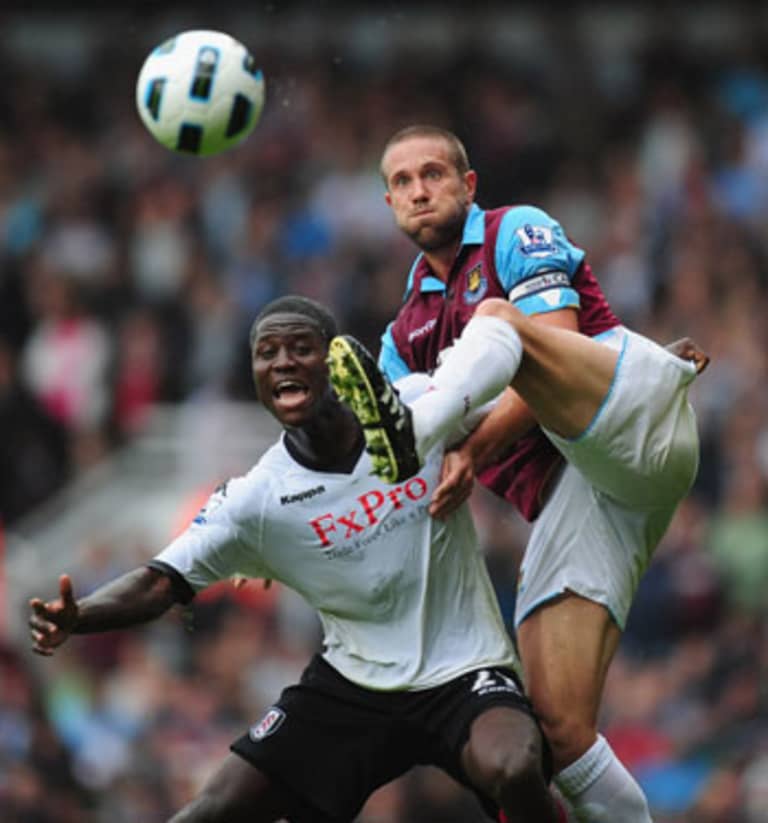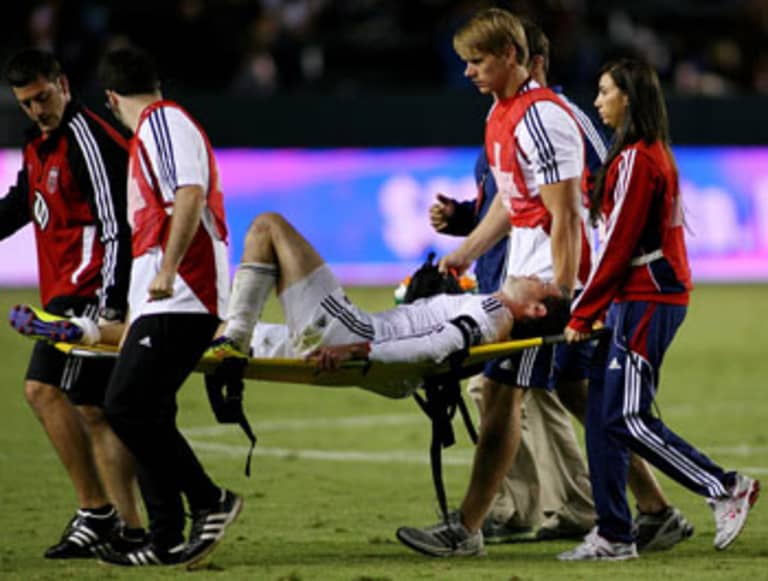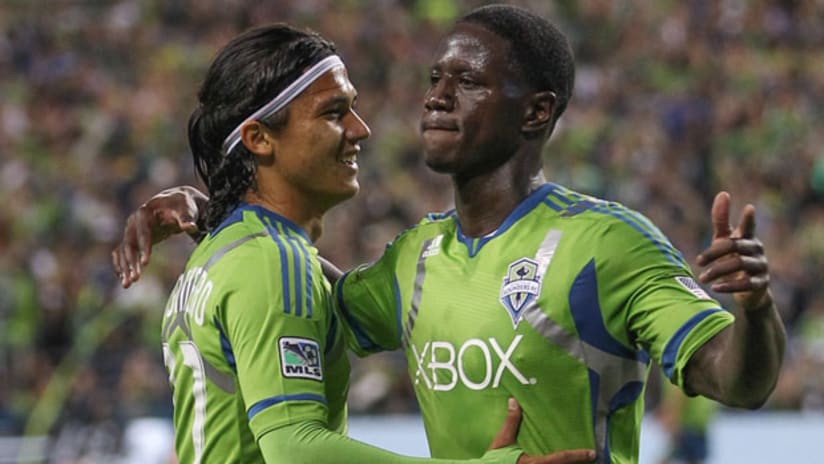No MLS award brings out the critics like the Comeback Player of the Year, because there’s always one question that no one can quite seem to answer.
OK, so what constitutes a comeback anyway?
Is it when you step back on the field for the first time since a guy barreled into you and snapped your leg in two places? Or maybe your ankle was smashed about 18 months ago and then some dude went and broke your foot during a preseason game down at Disney World, of all places, just when you thought everything was getting back on track.
Is it when you score 13 goals the season after surgeons carved you up to repair tears in your abdominal muscle and both hip adductors? How about when you return to MLS after your father passes away, an event so emotionally traumatic that you took an indefinite leave of absence with three months left in the season?
Or, in the case of this year’s winner, maybe you broke back onto the MLS scene after some European teams couldn’t find any room for you and a Mexican team passed you by because they said you couldn’t even pass the physical exam.
So goes the plight of Eddie Johnson, the Seattle Sounders forward who won the second Comeback Player of the Year Award of his career on Tuesday for what seems to be a comeback from, well, no one seems to know.

But that’s not EJ’s fault. Can you make light of the past few years of his career, when he circled aimlessly around Europe like Clark Griswold looking to get left at Big Ben? Johnson played for Fulham (right), Cardiff City, Aris and then finally for Preston North End, the last stop of a European tour that once seemed so, so promising when he bolted from US national team camp for a three-year deal with Fulham back in January 2008.
It’s impossible to quantify the emotional toll the adventure took on Johnson, who was 23 years old when that entire saga began. Ever had your dreams dangled in front of you and they were so close you could smell it, taste it and write home to tell everyone back in Florida or Dallas or Kansas City that yeah man, you were about to make it?
EJ did. And then he gradually lost all of it day by day, game by game, year by year. He largely disappeared into that wasteland of American players on loan somewhere still in Europe, the last you heard, but you can’t remember where exactly. Maybe it’s the English Second Division. Or maybe Portugal?
There’s some emotional damage done in there certainly, and here’s some more. Last summer his wife was arrested for in Florida for ramming his car with her Jeep following an argument. His younger cousin passed away suddenly too, a moment that nearly pushed Johnson into an abrupt and heartbreaking retirement that would have left most fans with one lasting impression: In the end, EJ was a failure.
Seattle fans know the rest. Johnson returned to MLS ahead of the 2012 season and promptly picked up where he left off back in 2007, finishing with a team-high 14 goals and willing the Sounders all the way to the Western Conference Championship for the first time in franchise history.
But is what Johnson did – returning humbly to the league where he started and thriving after he so willingly bolted for Europe nearly five years ago – really a comeback? How do we measure the emotional toll Johnson suffered when, it has to be said, he inflicted much of that on himself by not living up to expectations?
The other two finalists for this year’s award – and the majority of finalists for the award every year, in fact – have returned from some sort of damning injury that, in more extreme cases, threatened to end a player’s career. Cue the highlight of D.C. United’s Chris Pontius breaking his leg in a game against Chivas USA last September. Ask San Jose Earthquakes striker Alan Gordon what he thought of his 2012 aspirations after surgeries last August fixed nagging issues to his abdomen and hips, body parts entirely essential to simply getting out of bed, let alone enjoying the single best season of a nine-year career.
The other two players who received votes this year from the media, club personnel and players also came back from physical injuries. FC Dallas midfielder and 2010 league MVP David Ferreira finished fourth in the voting after he finally returned from the ankle injury that cost him 2011 and a broken foot that beat him back down again this spring. And Steve Zakuani – who gave us perhaps the best moment of the year when he finally returned from a broken leg and stepped into sweet, summer hysteria at CenturyLink Field in Seattle in July – finished fifth.
Was Johnson’s accomplishment any greater than these? What about the player I voted for, San Jose’s Steven Lenhart, who was a revelation in 2012 after his father passed away last summer and soccer suddenly became secondary? I’m certainly not surprised he didn’t win because he never showed up in traction or in a cast, but that doesn’t make his return any less impressive.
So what do we value? How exactly do we rank hurt?
As it turns out, MLS players and their bosses apparently have drastically different opinions. The players voted overwhelmingly for Johnson to win the award (34.04 percent to 19.15 for the runner-up Pontius), but the club personnel opted to honor a different storyline. Those votes – four each per team, typically filled out by the team president, technical director, head coach and one other team rep – went decidedly for Pontius, with 40.35 percent to Johnson’s 22.81.
The media collectively favored Johnson too – 37.88 percent to 24.24 percent for Pontius – but more than one scribe took to Twitter and promptly blasted the award’s credibility. That was just about all anyone could agree on: when it comes to the Comeback, no one knows what’s going on.
And this isn’t the first time the voters have left fans and players in the dark with this award. It went to LA’s David Beckham last year for recovering from a torn Achilles tendon (Charlie Davies somehow finished second), and Bobby Convey earned the honor in 2010 after microfracture surgery effectively ended his career in Europe and sent him home to MLS two years prior.
But Convey actually played 26 games in 2009, so did he really come back in 2010? Bay Area reporter Robert Jonas had this to say on Tuesday via Twitter: “Debate of whether or not Eddie Johnson deserved Comeback award reminds me of 2010 winner Bobby Convey asking, "’What did I comeback from?’"
How about Zach Thornton, who won the award in 2009? He was, improbably, the best goalkeeper in the league that season, but the Comeback Award came after bigger blows to his ego that anything else. Three teams – Chicago, Colorado and New York – deemed him expendable before he picked up the pieces with Chivas. Thornton was a beast that year, but he came back from having the blues.
And what of Johnson the first time around, when he won this award in 2007? He landed in Kansas City with a thud via trade from Dallas in 2006, but damned if he didn’t sort it out the next season to the tune of a career-high 15 goals and an offer sheet from Fulham. Am I missing something there, or was he just doing what a striker does: teasing and taunting you with maddening inconsistency?
Fans can argue any award MLS gives out, any year the league does it. MVP, for example, has and always will depend on one’s definition of valuable, and whether or not a fastidious worker bee like Osvaldo Alonso is actually more crucial to the Sounders’ success than New York’s Thierry Henry, who can disappear for weeks at a time before shredding Toronto FC for three assists and a goal.

But the Comeback Player of the Year? Voters may never truly sort that one out. MLS likely won’t narrow the criteria here to only physical injuries like the ones that felled Pontius (right) or Zakuani, a move that would make voting for this award a slam dunk. Emotional injuries – or whatever the voter considers to be real emotional trauma, anyway – can’t and likely won’t be expelled from the process, because it’s impossible to truly tell how far a player fell before he found his way back up.
If it’s such an ambiguous mess, how about doing away with the award for good? Not a chance. While it’s arguably the most frustrating honor MLS doles out, the player who wins it typically provides one of the best storylines of the season, and no league will pass up honoring that. The NBA, Major League Baseball, and NFL all offer the same award, and the criteria are typically just as vague.
The NFL’s award, for example, is given by the Professional Football Writers of America to the player who “shows perseverance in overcoming adversity, in the form of not being in the NFL the previous year, overcoming a severe injury, or simply a poor performance.” That allows for guys to suffer from EA Sports-related tendinitis, bust a leg or, as Michael Vick proved in 2010, serve 21 months in federal prison for running a dog fighting ring and come back and win the award.
Here’s the take from an MLS spokesperson: The Comeback Award “honors an MLS player who has overcome injuries and/or adversity in order to achieve success during the 2012 regular season.”
Adversity, as it turns out, is all in the eye of the voter, and that won’t change. Neither will the Comeback Award, which is fundamentally flawed, and without the hard and fast criteria that will likely never going to come, it will always be that way in every league. You can praise Johnson or pan him, but he’s in the books again as the winner of the most confounding award in sports.










